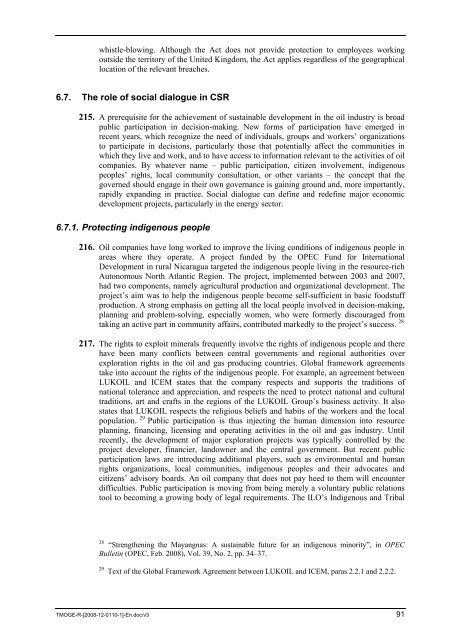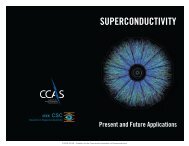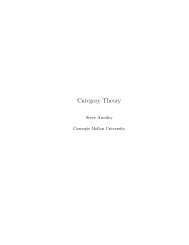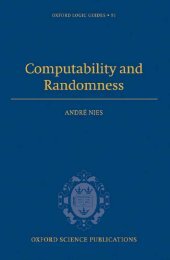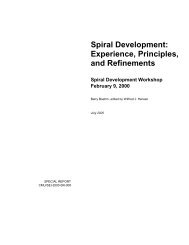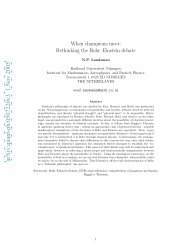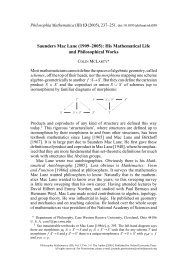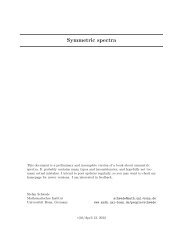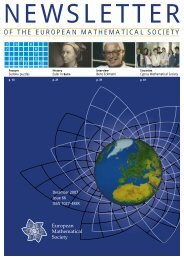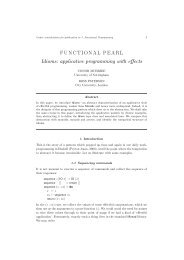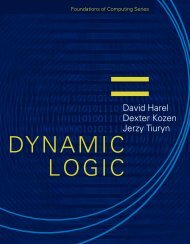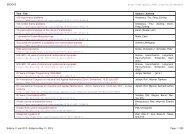wcms_161662
wcms_161662
wcms_161662
You also want an ePaper? Increase the reach of your titles
YUMPU automatically turns print PDFs into web optimized ePapers that Google loves.
whistle-blowing. Although the Act does not provide protection to employees working<br />
outside the territory of the United Kingdom, the Act applies regardless of the geographical<br />
location of the relevant breaches.<br />
6.7. The role of social dialogue in CSR<br />
215. A prerequisite for the achievement of sustainable development in the oil industry is broad<br />
public participation in decision-making. New forms of participation have emerged in<br />
recent years, which recognize the need of individuals, groups and workers’ organizations<br />
to participate in decisions, particularly those that potentially affect the communities in<br />
which they live and work, and to have access to information relevant to the activities of oil<br />
companies. By whatever name – public participation, citizen involvement, indigenous<br />
peoples’ rights, local community consultation, or other variants – the concept that the<br />
governed should engage in their own governance is gaining ground and, more importantly,<br />
rapidly expanding in practice. Social dialogue can define and redefine major economic<br />
development projects, particularly in the energy sector.<br />
6.7.1. Protecting indigenous people<br />
216. Oil companies have long worked to improve the living conditions of indigenous people in<br />
areas where they operate. A project funded by the OPEC Fund for International<br />
Development in rural Nicaragua targeted the indigenous people living in the resource-rich<br />
Autonomous North Atlantic Region. The project, implemented between 2003 and 2007,<br />
had two components, namely agricultural production and organizational development. The<br />
project’s aim was to help the indigenous people become self-sufficient in basic foodstuff<br />
production. A strong emphasis on getting all the local people involved in decision-making,<br />
planning and problem-solving, especially women, who were formerly discouraged from<br />
taking an active part in community affairs, contributed markedly to the project’s success. 28<br />
217. The rights to exploit minerals frequently involve the rights of indigenous people and there<br />
have been many conflicts between central governments and regional authorities over<br />
exploration rights in the oil and gas producing countries. Global framework agreements<br />
take into account the rights of the indigenous people. For example, an agreement between<br />
LUKOIL and ICEM states that the company respects and supports the traditions of<br />
national tolerance and appreciation, and respects the need to protect national and cultural<br />
traditions, art and crafts in the regions of the LUKOIL Group’s business activity. It also<br />
states that LUKOIL respects the religious beliefs and habits of the workers and the local<br />
population. 29 Public participation is thus injecting the human dimension into resource<br />
planning, financing, licensing and operating activities in the oil and gas industry. Until<br />
recently, the development of major exploration projects was typically controlled by the<br />
project developer, financier, landowner and the central government. But recent public<br />
participation laws are introducing additional players, such as environmental and human<br />
rights organizations, local communities, indigenous peoples and their advocates and<br />
citizens’ advisory boards. An oil company that does not pay heed to them will encounter<br />
difficulties. Public participation is moving from being merely a voluntary public relations<br />
tool to becoming a growing body of legal requirements. The ILO’s Indigenous and Tribal<br />
28 “Strengthening the Mayangnas: A sustainable future for an indigenous minority”, in OPEC<br />
Bulletin (OPEC, Feb. 2008), Vol. 39, No. 2, pp. 34–37.<br />
29 Text of the Global Framework Agreement between LUKOIL and ICEM, paras 2.2.1 and 2.2.2.<br />
TMOGE-R-[2008-12-0110-1]-En.doc/v3 91


